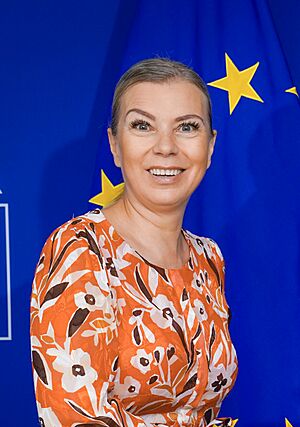Elżbieta Bieńkowska facts for kids
Quick facts for kids
Elżbieta Bieńkowska
|
|
|---|---|

Bieńkowska in 2019
|
|
| European Commissioner for Internal Market and Services |
|
| In office 1 November 2014 – 30 November 2019 |
|
| President | Jean-Claude Juncker |
| Preceded by | Michel Barnier |
| Succeeded by | Thierry Breton (Internal Market) |
| European Commissioner for Industry and Entrepreneurship | |
| In office 1 November 2014 – 30 November 2019 |
|
| President | Jean-Claude Juncker |
| Preceded by | Ferdinando Nelli Feroci |
| Succeeded by | Office abolished |
| Deputy Prime Minister of Poland | |
| In office 27 November 2013 – 22 September 2014 |
|
| President | Bronisław Komorowski |
| Prime Minister | Donald Tusk |
| Preceded by | Jacek Rostowski |
| Succeeded by | Tomasz Siemoniak |
| Minister of Infrastructure and Development | |
| In office 27 November 2013 – 22 September 2014 |
|
| President | Bronisław Komorowski |
| Prime Minister | Donald Tusk |
| Preceded by | Office established |
| Succeeded by | Maria Wasiak |
| Minister of Regional Development | |
| In office 16 November 2007 – 27 November 2013 |
|
| President | Lech Kaczyński Bronisław Komorowski (Acting) Bogdan Borusewicz (Acting) Grzegorz Schetyna (Acting) Bronisław Komorowski |
| Prime Minister | Donald Tusk |
| Preceded by | Grażyna Gęsicka |
| Succeeded by | Office abolished |
| Personal details | |
| Born | 4 February 1964 Katowice, Poland |
| Political party | Civic Platform |
| Spouse | Artur Bieńkowski |
| Children | 3 |
| Education | Jagiellonian University Polish National School of Public Administration SGH Warsaw School of Economics |
Elżbieta Ewa Bieńkowska was born on February 4, 1964. She is a Polish politician who held important roles in both Poland and the European Union. She served as Poland's Deputy Prime Minister and also as a Minister. Later, she became a European Commissioner from 2014 to 2019, working as part of Jean-Claude Juncker's team.
Before her roles in the European Union, Bieńkowska was the Minister of Regional Development in Donald Tusk's government from 2007 to 2013. In 2013, she also became the Deputy Prime Minister of Poland. At the same time, she continued her work at the Ministry of Infrastructure and Development.
Contents
Education and Early Career
Elżbieta Bieńkowska studied at Jagiellonian University. In 1989, she earned a Master's degree in studies about Eastern cultures. She also completed a special program at the Polish National School of Public Administration. After that, she earned a postgraduate MBA from SGH Warsaw School of Economics.
Her career in public service began at the Katowice City Council. She worked on projects for the region. In 1999, she became the head of Katowice's Department for Economy. Later that year, she was chosen to be the Director of Regional Development for the Silesian Voivodeship, which is a large region in Poland. She held this position until 2007.
Political Journey
Elżbieta Bieńkowska describes herself as a "technocrat." This means she focuses on practical solutions and expert knowledge rather than political ideas. She is not a member of a political party. However, she was elected to the Senate of Poland in 2011 with support from the Civic Platform party.
Minister in Poland (2007–2014)
In the government led by Prime Minister Donald Tusk, Bieńkowska served as the Minister for Infrastructure and Development. She was also the Deputy Prime Minister from late 2013 until September 2014. In these roles, she was in charge of managing money from the European Union. She also oversaw Poland's transportation systems.
Her ministry was very important, being the second largest in Poland after the finance ministry. It had many employees and deputy ministers. In 2013, she successfully secured a large amount of money, €105.8 billion, from the EU budget for the years 2014-2020. This funding was crucial for Poland's development.
European Commissioner (2014–2019)
On September 3, 2014, Elżbieta Bieńkowska was chosen as Poland's nominee for the European Commission. This is a very important body in the European Union. On September 10, 2014, Jean-Claude Juncker named her the European Commissioner for the Internal Market, Industry, Entrepreneurship, and SMEs. She officially started this role on November 1, 2014, as part of the Juncker Commission.
As a Commissioner, Bieńkowska was responsible for the industrial side of the EU's defense and security plans. She also led a special group focused on defense research. In 2016, she suggested creating the European Defence Fund. This fund aimed to help European countries work together on defense projects, especially after Britain decided to leave the EU.
During her time in office, Bieńkowska also pushed for the European Commission to have more power to check car safety and emissions. This was especially important after the Volkswagen emissions scandal. In 2018, she called for investing €20 billion from the Horizon Europe fund into research on artificial intelligence.
Honors and Awards
Personal Life
Elżbieta Bieńkowska is married to Artur Bieńkowski. They have three children together.
See also
 In Spanish: Elżbieta Bieńkowska para niños
In Spanish: Elżbieta Bieńkowska para niños
 | Audre Lorde |
 | John Berry Meachum |
 | Ferdinand Lee Barnett |

